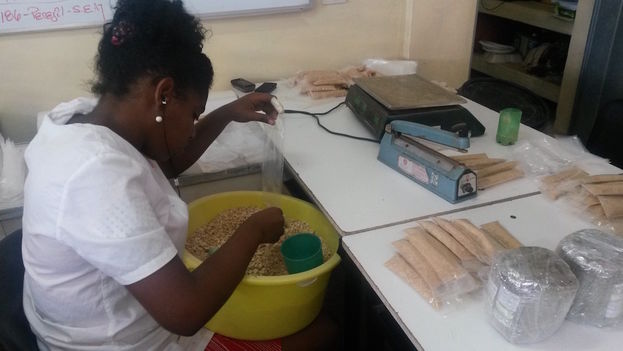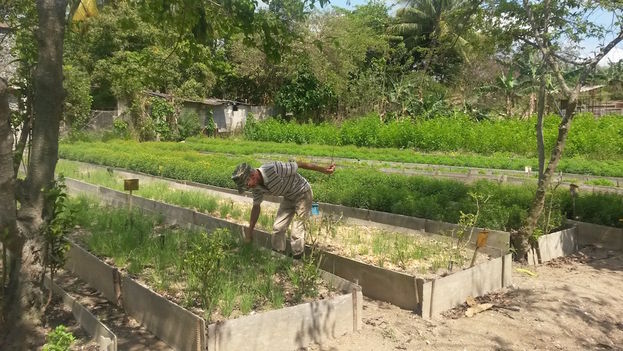
14ymedio, Lilianne Ruiz, San Miguel del Padron, 24 April 2016 — The spice route of Purita Industries begins with the pruning camp a short distance from the production workshop. It continues in the room where the machine is, a heated dehydrator designed by a mechanical engineer that processes 200 pounds of plants in 24 hours.
Located in San Miguel del Padron, to reach Purita’s farm you have to cross the Güines highway and continue down Dolores Street “until you can sense the odor of the seasonings,” as a nearby neighbor directs.
The aroma of the spices hits your nose before you enter the little factory. They produce basil, celery, rosemary, chives, tarragon and garlic, all “one hundred percent natural,” according to the producers. They also produce dried peppers, peanuts and shredded coconut.
Purita Industries is made up of a group of 11 professionals associated in the form on a non-agricultural cooperative founded two years ago, with a license to produce spices, condiments and dried fruits. “We are a small group of people who, with great effort, are trying to produce a highest quality product,” says the computer engineer Liuder Raspall, who became president of the entity.
The technology they work with is almost handmade. The dehydrator is designed by a mechanical engineer but constructed “together” by the workers, says Alfredo Gonzalez, farmer and partner. The equipment is made from galvanized metal and steel with nickel, with thermal insulation. Although currently it works off liquid glass and electricity, it was designed to also work with biogas and solar panels.
Certified by the National National Institute of Hygiene and Epidemiology, Purita products retain up to 60% of their organoleptic properties, that is those those that stimulate the senses to identify foods. A sample of them is taken to the laboratories of the institute to be periodically evaluated.
“The key to getting a product that, after being dehydrated, continues to have the aroma, the taste and the color is to maintain a temperature between 60 and 70 degrees and a continuous flow of air in one direction,” Raspall explains as he shows a package of light green chives, and describes that “the air supplied in a mandatory sense passes over the plants, removes moisture and does not return to touch them, because they would be rehydrated.”
At least ten fresh plants are required to get 2.2 pounds of dehydrated. Maintaining a stable volume of production is a challenge for Gonzalez, who has convinced farmers like himself in the surrounding area to plant herbs for culinary use. “We are starting to create direct partnerships with farmers who want to grow healthily, to operate the field in a certain way,” he says.
Farmers who have engaged in this new experience have discovered how profitable is to cultivate these herbs, because some, such as tarragon, thrive so easily that they hardly need watering if there are normal rains. “Science is pruning the branches in the right place,” Gonzalez said, pointing to a level in the basil. Plants are pruned every 21 days and some can last up to 10 years. Another incentive to plant is that the rational use of fields means that the crops never spoil.

The route of the spices, seasonings and nuts Purita ends in the stalls, which until very recently were only allowed in agricultural fairs held sporadically. Coming soon will also be a few sales points in the Ideal markets in the capital, a network of state stores that sells in Cuban pesos. A disadvantage in those places is that the lack the design of the space and striking publicity graphics to attract clients; for now people only look there for the cheapest deals.
“One of the things that we have in a difficult financial state is to make the price affordable to consumers,” says Raspall, who along with the rest of the associates is expecting to gain sales volumes. The Purita products sell for 15 Cuban pesos (about 60¢ US) for 20 grams. In this way they compete with El Portro, a state company that sells imported spices that cost up to 2.80 CUC (about $2.80 US) for 20 grams.
El Portro seasonings have not been available to suit all budgets, so the challenge for Purita is to show its existing customers their quality and the begin to promote their spices to the rest of the population, used to using cheaper artificial seasonings, along with garlic, onion and chili, which shouldn’t be missing in the ailing Cuban cuisine.
Purita products are also sold on several digital pages that let people buy them pre-paid from abroad for delivery to friends or family in Cuba.
In the workshop, very close to the current dehydrator, which has a 100 pound capacity and works two shifts a day, new opportunities are already being conceived. The same formula will be improved in some detail and, above all, the equipment is much larger and can produce a ton of seasonings daily.
The technology could help strengthen the spice industry, for example by introducing freeze-drying techniques. However, importing equipment is difficult. “This cost us very little money compared to a Rational that would cost about $75,000 (US), and the big difference would be that that one would have temperature sensors and automatic regulators,” he concludes.
